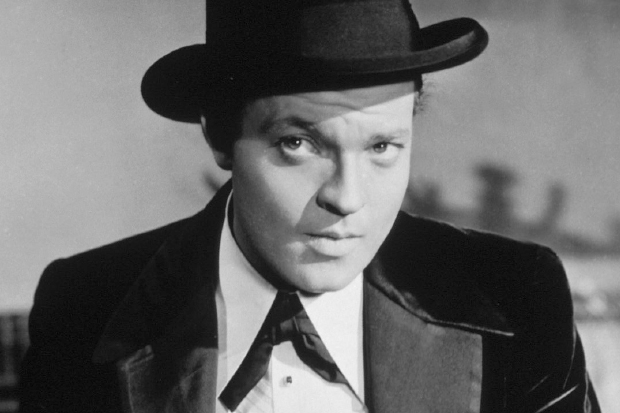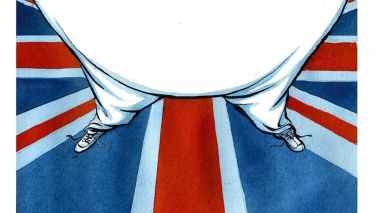One day in May 1948 in the Frascati hills southeast of Rome, Orson Welles took his new secretary, Rita Ribolla, to lunch. After eating enough food for ‘a dozen hungry people’ and sinking ‘one glass of wine after another’, all the while enchanting his guest with gossip and conjuring tricks, Welles downed his coffee and said it was time to go. Ribolla smiled and waited for him to get the bill. And waited. Eventually she asked for it herself. When it arrived Welles passed it over, saying, ‘Leave a large tip for these nice waiters.’ ‘But Mr Welles, I can’t afford meals like this.’ Welles turned sulphurous: ‘How dare you go out with me with not enough money?’, he said as he stormed out. ‘It’s OK lady,’ a waiter comforted the weeping Ribolla. The owner ‘knows the signore well’. Men like him are ‘too involved with creating to be bothered by such minor matters as paying’.
And there you have him, the Hollywood big boys would say. If you wanted an aesthetic visionary, bursting with last-minute, off-the-wall ideas, Welles was your go-to guy. If, on the other hand, you wanted a picture brought in on time and under budget — steer well clear. Who could demur? Welles had an IQ of 185 (well on to genius terrain), but he never understood that the cinema isn’t first and foremost an art. It’s a machine for making money. Anyone unhappy being a cog won’t fit in.
Certainly Welles didn’t. In 1939, when he arrived in Hollywood as the brains behind a succession of Broadway smashes and radio sensations (each evoked wondrously in Patrick McGilligan’s granularly detailed Young Orson), he so awed the studio bosses that they granted him what they had never granted any director: carte blanche. A couple of years later, with a string of unfinished or abandoned projects behind him, he was never more than a word away from the brown envelope. In between times, of course, Welles had made Citizen Kane — a movie of such startling invention that three quarters of a century on it is still many a critic’s pick for the greatest of all time. ‘I started at the top,’ Welles would quip in later life, ‘and worked my way down.’
Not so, says Simon Callow, in the third volume of what has become a projected four-volume life. Just look at what Welles achieved between the mid-1940s and the mid-1960s. To be sure, the years covered in One Man Band were years in which Welles, self-exiled in Europe, was reduced to appearances in hack thrillers and mood-free melodramas. But he took such parts in order to fund the production of his own still boundary-bursting work. Facetious as Welles’s false-nosed turn is in Herbert Wilcox’s Trent’s Last Case, his fee helped fund the expressionistic sets and cubist camerawork in Mr Arkadin. Gregory Ratoff’s Dumas-derived potboiler Black Magic would be ridiculous even without its star’s grand guignol turn. But the gurning paid for the quicksilver cutting that makes Welles’s shoestring version of Othello so much more dazzling than the film of the Olivier’s National Theatre production.
And anyway, Welles’s ham could salt the right dish nicely. If The Third Man is Carol Reed’s only great picture, then that is thanks to the chill charm Welles brings to its drug baron, Harry Lime. The job of the director, Welles once said, is to preside over accidents. Reed presided over one of the happiest accidents in movie history. So accidental, says Callow, that it almost didn’t come off. Because while Reed wanted Welles for the movie, his producer, David O. Selznick, thought Welles box- office poison and fancied Noël Coward as Lime. Eh? As Coward said to Ian Fleming when Fleming suggested he try for the part of Dr No, ‘No! No! No!’
Welles could be equally damning about the roles he was offered — except that being Welles he saved the naysaying for after he’d signed the conract. ‘He behaved more or less badly on virtually every film he did not direct,’ says Callow. Why? Because ‘he felt it was beneath him to appear in other, inferior men’s work’. Not that One Man Band is all acrimony and rancour. It would be stretching things to call the book’s narrative arc any more conventional than that of a Welles script. Nonetheless, after a rug-pulling second-act reversal in which Welles’s noir thriller Touch of Evil is torn from his hands and massacred by the moneymen (it has subsequently been restored according to Welles’s instructions and revealed as a masterpiece), we arrive at a happy ending, with Chimes at Midnight, Welles’s magical mash-up of Shakespeare’s Henry plays that took two special awards at Cannes.
As well as writing and directing (and even designing the costumes), Welles also starred in the movie, playing what he called ‘the only great character in dramatic literature who is also a good man’ — Falstaff. Over the years, Callow has come to be no less admiring of Welles. When he started out on this project he hoped ‘to correct the myths that Welles and others had spun about him’. Three decades of research on, he has come to believe his man simply ‘was the myth… a figure from an old tale, a giant and a wild man, like the Orson of the early French romance’.
Indeed so. And the good news is that Callow is a big enough writer to pin this beast down and get under his skin. ‘The business of the actor,’ Welles once said, ‘is to increase the awareness of each person in the audience of his being alive.’ With this book — less a biography than an imagined reliving of a life — Simon Callow returns the favour.






Comments